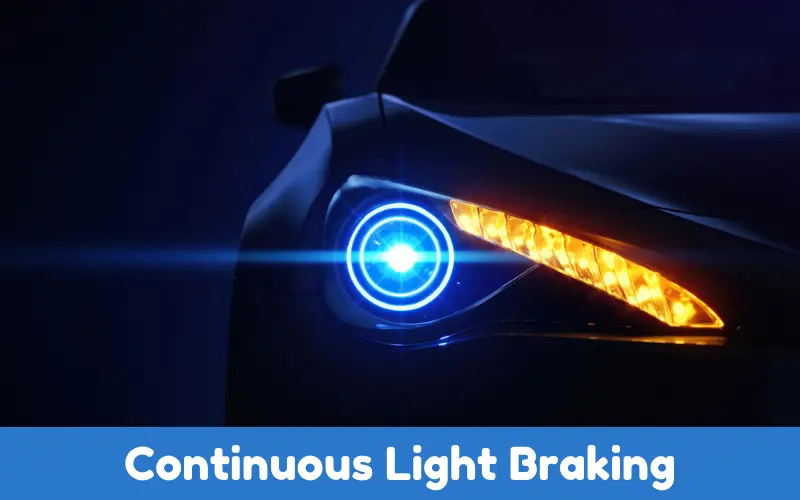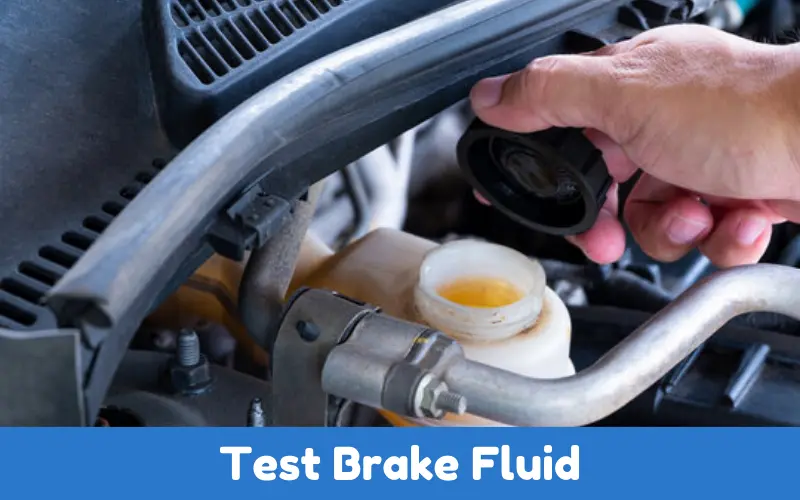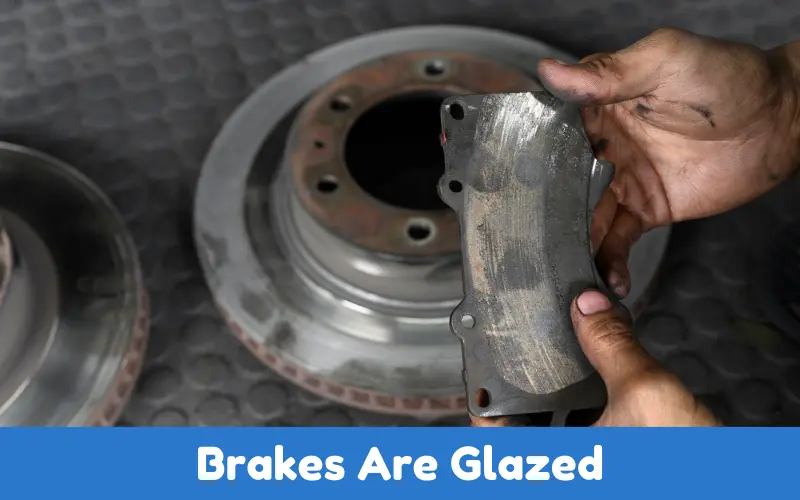Brake glazing is one of the most common issues most car owners face. It occurs when brake pads wear an excessively glossy, shiny surface due to overheating caused by frequent hard stops or pads made up of the wrong material.
Having a shiny and glossy surface on brake pads reduces friction, affecting the braking distance and decreasing brake performance.
Let’s find out what does it mean brakes are glazed, how it affects your driving experience, and what you can do to fix it.
Topic Summary
What Does It Mean Brakes Are Glazed?
The formation of a slick, hard, shiny layer on the surface of the brake pad or shoe causes brake glazing. It is caused either by excessive heat due to frequent hard braking or by using the wrong type of brake pad.
If the brake pads become too hot, the binding resins within the pads can melt and form a glossy surface, reducing the frictional nature of the surface and making it less effective in slowing the vehicle.
What Causes Glazed Brakes?
When your brakes are described as having become ‘glazed,’ this signals a condition where the brake pads or shoes are now shiny, flat, and hard.
This is because of a thermal process that deforms the brake pad material in a way that makes the brakes work less efficiently compared to the intended way.
Here follow the steps above, which explain the causes of brake glazing:
Maximum Heat and Friction
The result of glassing is evident when the running of the brakes has become so excessive that the brake pads have become excessively hot.
Glassing is normally seen when the vehicle has been driven at speed with the brakes constantly on or driven with the brakes being consistently applied in a ‘heel and toe’ fashion.
Glassing is a result of the binding resins in the brake pads melting and forming a glass like finish on the pad surface.
Unsuitable Pad Material
Installing brake pads that were not designed for the vehicle’s use pattern (such as regular brake pads on a performance vehicle that’s used for high speed driving) will cause fast glazing.
Continuous Light Braking
Applying a constant amount of pressure, too, can cause the pads to glaze over since they never get hot enough to wear in a normal fashion, so the top surface can become hardened.

Effects of Glazed Brakes
Glazed brakes can have a major impact on how well your vehicle performs and how safe it is to drive. Here is a look at the top three problems caused by glazed brakes:
Reduced Friction and Stopping Power
The hard and smooth glazed pads have less friction against brake rotors or drums, which means it takes longer for your car to tackle the initial stopping. Compared to metallic brake pads, glazed brake pads have a longer stopping distance.
Increased Wear on Brake Components
As a direct result of the pads not touching the rotors properly, the mismatch between the two components can lead to increased wear on both. Often, this leads to uneven rotor wear and the need to replace or resurface them prematurely.
Noise and Vibrations
If your brakes are glazed, you’ll hear a squealing or grinding sound when braking and you’ll also feel a pulsation in the brake pedal or the steering wheel as the brake pads or rotors are uneven.
Heat Damage
This glazing can cause further damage to the brakes because temperatures are intense enough to cause heat damage to the braking system, either the brake fluid or other components of the braking system.
Compromised Brake Performance in Various Conditions
Glazed brake performance can vary so greatly in the street or track conditions that they’ll stop even worse in potentially dangerous weather conditions (e.g., wet or icy) that can benefit from maximum friction to prevent skidding.
Glazed brakes need to be refurbished by taking them to a professional. Otherwise, performance and safety may be compromised.
How To Fix A Glazed Brakes?
Fixing glazed brakes is important as it helps to effectively fix the glazed brakes rather than drive with them. Following the mentioned steps will help you restore the glazed brakes to their usual working state.
1. Check the Brakes
Have a mechanic check your brakes to find out if it’s just glazing or if there’s underlying damage to rotors or drums.
2. Change Brake Pads
The right answer is usually going to be to remove the glazed brake pads and avoid their use entirely, replacing them with fresh pads suitable for the miles you drive.
3. Resurface or Replace Rotors
If the rotors are uneven or damaged, the rotor surface needs to be machined (resurfaced) or replaced.
4. Test Brake Fluid
Check the brake fluid and replace it if it has degraded. High temperatures can cause the fluid to go bad.

5. Adjust Driving Habits
Next, adjust your driving habits by not habitually applying the brakes hard or riding the brakes.
If you find that your brake shoes are glazed, then you’ll want to address the problem soon to protect both your safety and the life of your brakes. If you found your brakes glazed, it’s best to have them looked at by a professional mechanic before getting back on the road.
Regular maintenance and mindful driving can help prevent future occurrences of glazed brakes.
Can I Drive with Glazed Brakes?
It is possible to drive with glazed brakes, but it is unsafe. Glazed brakes have a smooth, hardened surface that significantly reduces friction and inhibits solid brake pad contact.
Glazed brakes can increase stopping distances and cause brakes to cease functioning effectively, especially in an emergency when you need to rapidly stop the vehicle.
You might hear some squealing and experience the brake pedal feels as if it is pulsating or vibrating, which means your brakes are operating in a degraded manner.
Ignoring glazed brakes and continuing to drive like this can also result in the more extensive breakdown of other components of the braking system (such as the rotors) that might then require more extensive and expensive repairs.
For these reasons, glazed brakes are ideally dealt with sooner rather than later. This means taking your car to a mechanic or someone else qualified to check the problem and deal with it (which generally involves either replacing the brake pads or resurfacing the rotors).
FAQs on What Does It Mean Brakes Are Glazed
What Causes Brake Glazing?
Another cause of brake glazing, much less common these days, is excessive heat from over-braking or the use of inappropriate (often shiny) brake pad material in a vehicle that is subject to heavy braking more than normal. This heat will cause the resins in the brake pad material to melt, creating a slick, highly polished surface that reduces friction.
How Can I Tell If My Brakes Are Glazed?
Symptoms of glazed brake pads can include reduced braking performance, as well as squealing or some other ‘funny’ noise when braking, and often a feeling of vibration or pulsation of the brake pedal or steering wheel.
Is Brake Glazing Dangerous?
Indeed, brake glazing is dangerous as it reduces the effectiveness of your brakes and could lead to crashes, especially when you brake suddenly. It makes your stopping distance longer.
Can I Fix Glazed Brakes Myself?
Because the glazing is usually on the surface of the brake pad, it can sometimes be ground away (roughened) or refreshed by someone with the appropriate knowledge and tools, thus regenerating some of the friction properties of the pads. Often, replacing is still the recommended course of action. Sometimes, the rotor can also be damaged, and this may need to be resurfaced as well.
How Can I Prevent My Brakes from Glazing?
If you use the right brake pads for your vehicle and usage and don’t overwork them with lots of hard braking (which should be avoided in any case) or riding, glazing should be minimal if you avoid the other ugly warning signs. Otherwise, regular maintenance and counts should ensure that your brakes won’t glaze before they wear completely.
Conclusion
Although it is a totally preventable problem, brake glazing causes serious safety and mechanical issues that get in the way of the vehicle’s braking efficiency.
If you understand what causes it and are able to spot the symptoms in their early stages, you will be able to take some simple yet proactive steps that will guarantee you will never have glazed brakes.
Properly maintained brakes, along with the use of suitable brake pads and a commonsense driving style that doesn’t tend to put the brakes on and off rapidly, can help to avoid brake glazing altogether.
If you experience glazed brakes, as suspected by the warning signs, you should immediately drive the car to a mechanic to be sure you are not operating on the road with glazed brakes.

